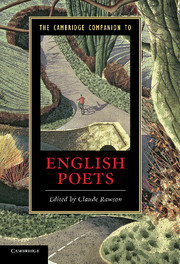Book contents
- Frontmatter
- Introduction
- 1 Geoffrey Chaucer
- 2 Thomas Wyatt
- 3 Edmund Spenser
- 4 William Shakespeare
- 5 John Donne
- 6 Ben Jonson
- 7 George Herbert
- 8 John Milton
- 9 Andrew Marvell
- 10 John Dryden
- 11 Jonathan Swift
- 12 Alexander Pope
- 13 William Blake
- 14 Robert Burns
- 15 William Wordsworth
- 16 Samuel Taylor Coleridge
- 17 George Gordon, Lord Byron
- 18 Percy Bysshe Shelley
- 19 John Keats
- 20 Alfred Lord Tennyson
- 21 Robert Browning
- 22 Emily Brontë
- 23 Christina Rossetti
- 24 Thomas Hardy
- 25 William Butler Yeats
- 26 D. H. Lawrence
- 27 T. S. Eliot
- 28 W. H. Auden
- 29 Philip Larkin
- Further Reading
- Index
21 - Robert Browning
Published online by Cambridge University Press: 28 May 2011
- Frontmatter
- Introduction
- 1 Geoffrey Chaucer
- 2 Thomas Wyatt
- 3 Edmund Spenser
- 4 William Shakespeare
- 5 John Donne
- 6 Ben Jonson
- 7 George Herbert
- 8 John Milton
- 9 Andrew Marvell
- 10 John Dryden
- 11 Jonathan Swift
- 12 Alexander Pope
- 13 William Blake
- 14 Robert Burns
- 15 William Wordsworth
- 16 Samuel Taylor Coleridge
- 17 George Gordon, Lord Byron
- 18 Percy Bysshe Shelley
- 19 John Keats
- 20 Alfred Lord Tennyson
- 21 Robert Browning
- 22 Emily Brontë
- 23 Christina Rossetti
- 24 Thomas Hardy
- 25 William Butler Yeats
- 26 D. H. Lawrence
- 27 T. S. Eliot
- 28 W. H. Auden
- 29 Philip Larkin
- Further Reading
- Index
Summary
A good many oddities and a good many great writers have been entombed in the Abbey; but none of the odd ones have been so great and none of the great ones so odd.
(Henry James, ‘Browning in Westminster Abbey’)What James says is right on the mark. Robert Browning is the oddest of the great English poets. His poetry is odd in the sense that it is peculiar, strange, idiosyncratic, even weird, or uncanny. The famous dramatic monologues included in most anthologies and course syllabuses (‘My Last Duchess’, ‘Fra Lippo Lippi’, ‘Porphyria’s Lover’, ‘Soliloquy of the Spanish Cloister’, ‘The Bishop Orders His Tomb at Saint Praxed’s Church’, and so on) hardly give a full sense of that strangeness, though they do have an odd propensity to give voice to deep-dyed villains. The oddness in question is partly due to the psychological peculiarities of those who speak in Browning’s poems. Perhaps, however, it most conspicuously lies in his poetry’s notorious peculiarities of diction and syntax, as these reflect or represent the psychological oddnesses of imagined characters. ‘Imagined’ applies even when the speakers are historical personages, such as the Renaissance Italian painter Fra Lippo Lippi. Lippi really existed. Browning learned about him from Vasari’s Le Vite de’ Pittori (Lives of the Painters, 1550, 1568). Nevertheless, Browning invented, on this basis, Lippi’s speech and the dramatic situation of ‘Fra Lippo Lippi’. He did this by trying to imagine what it would have been like to be Fra Lippo Lippi.
- Type
- Chapter
- Information
- The Cambridge Companion to English Poets , pp. 392 - 407Publisher: Cambridge University PressPrint publication year: 2011
- 1
- Cited by



